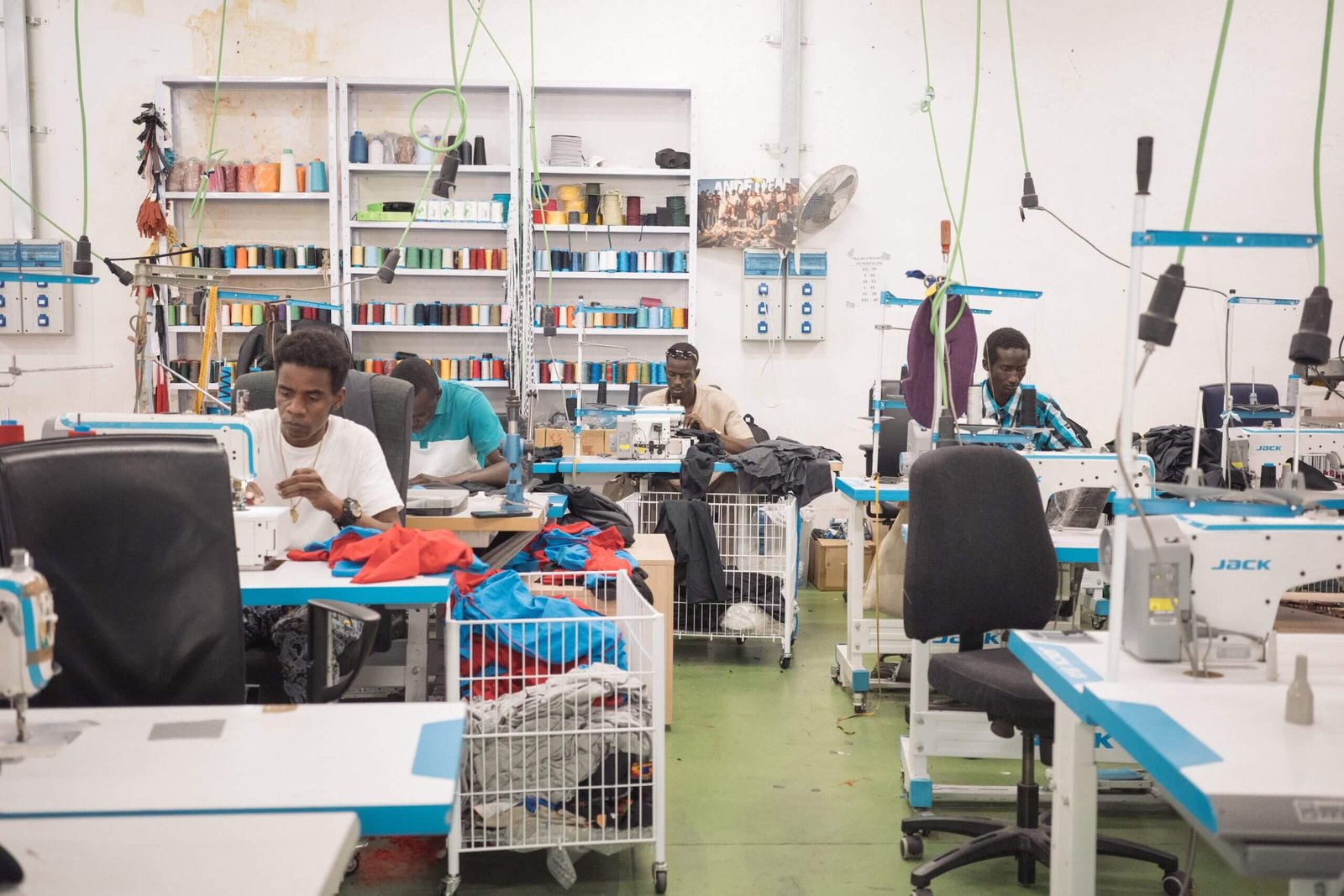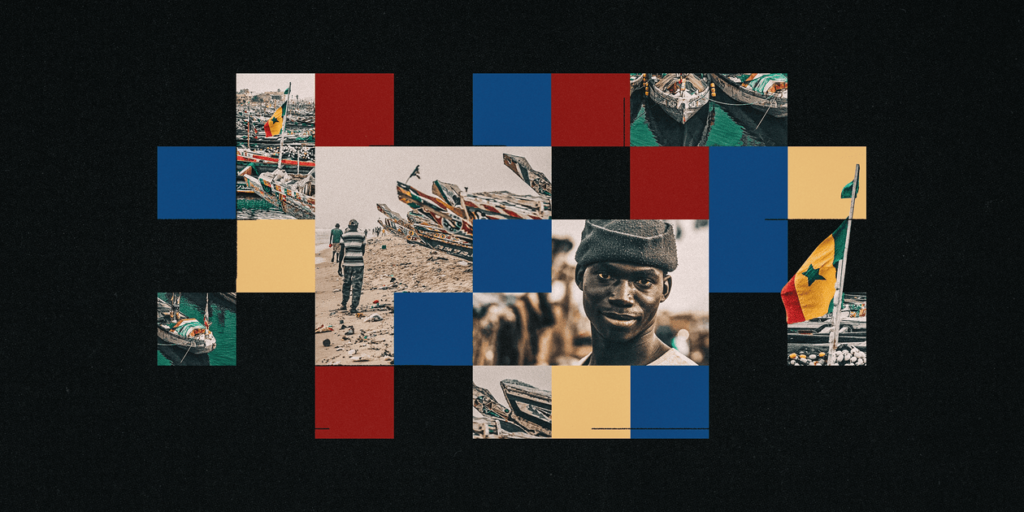Click here to view The Athletic’s UK Black History Month collection.
Walking through the streets of Barcelona, there’s a common slogan you are bound to spot among the graffiti around the city: ‘Barca o mort’ (Barca or death, in Catalan).
For some of Barca’s most fervent fans there is an almost religious bond with the club. Almost 5,000 kilometres away on the west coast of Africa, a similar expression reflects a very different reality.
In Senegal, it is ‘Barca ou Barzakh’. Barzakh is an Arabic word that literally means ‘isthmus’. In Islam, it describes a stage of the afterlife where souls rest until judgement day.
The phrase is like a rallying cry. It is an expression of solidarity, of shared hope before a voyage towards peril, leaving peril behind. Reach Barcelona, or die trying.
It is a phrase familiar to Aziz Faye and Lamine Sarr, two former ‘manteros’. That is the colloquial Spanish term given to immigrant street vendors who operate around tourist hotspots. It comes from the word ‘manta’ meaning blanket, referring to how wares are usually presented on large blankets or sheets laid out on the pavement.
Street sellers lay out their wares in central Barcelona in 2016 (Pau Barrena/AFP via Getty Images)
In 2006, Faye and Sarr left their native Senegal on small boats that sailed for Spain. They were deported and repeated the journey several times before eventually settling in the country permanently.
Once in Barcelona, they helped to found Top Manta, a clothing brand co-operative that now employs hundreds of former manteros. One of their recent designs featured the phrase (in Spanish) “Barca o Barzakh”, on the back of a T-shirt with Barcelona colours.
“Barca or Barzakh is a dual cry of desperation and hope,” is how the company describes the phrase. “The desperation of being born into a nation scarred by centuries of enslavement and exploitation, and the hope of reaching the prosperous lands that have benefited from these very exploitations — Europe, a beacon of economic prosperity, democracy, and human rights.”
The Athletic met with Faye and Sarr at Top Manta’s workshop, a former textile factory in the neighbourhood of Sants — the south-western part of Barcelona bordering l’Hospitalet de Llobregat. It was lunchtime, but the sound of knitting machines never seemed to cease, even as staff members took turns heating up their lunch in the kitchen microwave.

The Top Manta workshop in Sants, Barcelona (Top Manta)
“It will be hard to find a quiet place to chat,” Faye said in Catalan as he held out his hand in greeting. He and Sarr are spokespeople for Top Manta and survivors of the sea journey from Senegal’s capital Dakar to the Canary Islands. They both uttered the phrase “Barca ou Barzakh” before setting out to sea.
Barca is used as a generic word for Barcelona, Spain and Europe, they said. They recalled that, in their experience, few had a very clear idea about where exactly Barcelona was, but everyone knew the football team. Some of the younger members of their party even dreamed of playing for them.
They saw their destination as a place where they could succeed. They expected the hardest part to be the journey itself, and that when they arrived they would reach the promised paradise. What they found was quite different.
A police officer speaking with a ‘mantero’ near El Vendrell in Catalonia (Ramon Costa/SOPA Images/LightRocket via Getty Images)
“When we studied history, we were not told about the history of our own country but about Europe,” Sarr said. “It is mental colonisation, a colonial programme that has been imposed there so that we are Africans but we don’t feel like Africans. We always looked at what was in America or in Europe.
“When we came here, we found another reality and we were very surprised. We thought that Europe was a space of law, a democratic space where there was no racism, no inequality, none of that. And when we arrived here we found the opposite.”
In Senegal, Faye was a fisherman. But he said he suddenly stopped seeing fish in the sea, coinciding with the arrival of much larger boats exploiting the area.
“I went very far to find fish,” he said. “I ended up spending a lot on petrol and it wasn’t sustainable, because I couldn’t afford it. And even if I went far, I still couldn’t find fish.”
Sarr is the son of farmers and he grew up in the countryside. Like Faye, he wanted to leave Senegal because of economic problems. Neither had any hope the situation would change for them there.
“The new colonialism or the mismanagement of African governments, the power they exercise, makes anyone migrate,” Sarr said. “Even if you had studies and all the qualifications, you will never have the hope of being able to work, because there is an elite of people who monopolise all the power.
“To work you always have to have a link with those people. These practices are what forced me to leave Senegal, because I felt like a foreigner in my own country. I knew I was stepping on a very rich land, full of very important resources. Phosphate, oil, diamonds, gas, gold. Even so, having all that, we felt very poor.
“With all these factors, all these difficulties, I pushed myself to risk my life and come here to Europe.”
A boat from Senegal with 85 migrant people on board approaches La Restinga on the Canary island of El Hierro in August (Jose Antonio Sempere/AFP via Getty Images)
Faye knew the route to Tenerife. He said each of his journeys varied “depending on the sea and the wind” but they were each “really hard, five-day trips”.
He added: “It’s not the same for a group of fishermen to organise a trip as it is for people who have never seen the sea. For me, it was similar to a working day. I was a fisherman, we were used to what the sea is like, to the fear of the sea. But you did see other boats along the way that had accidents. That was shocking.
“The sea is wild. There’s no genius there, it’s luck. There are many people who die at sea.”
Three times Faye arrived on Spanish soil from Senegal, sailing up the west African coast, and three times he was deported as an illegal immigrant.
“I applied for a visa twice at the French Embassy and was refused,” he says of the alternative routes he tried when back in Senegal.
“To get a visa they asked you for requirements that were impossible to get. Requirements like having a bank account with a lot of money, a work contract. Most people there wanted to leave the country precisely because of not having that, we didn’t even have a bank account.”
Faye eventually managed to settle in Spain in 2015. He wanted to work, but without an NIE (Número de Identificación de Extranjero – a tax identification number that foreign residents are required to have in the country) his options were limited.
“Talking to different colleagues I was told that the only solution was to be a street vendor,” he said.
A 2019 street protest calling for greater rights and respect for manteros (Paco Freire/SOPA Images/LightRocket via Getty Images)
“But the problem is that you are exposed to the police. They chase you every day and can fine you, lock you up again in the CIE (Centro de Internamiento de Extranjeros — temporary detention centres where illegal immigrants are held) or even deport you.
“We started to hold assemblies, to explain that what was happening to us was not normal, and then a comrade died in Salou in 2015 (a fellow activist called Mor Sylla). That’s when we said enough was enough.
“That day we took to the streets to demonstrate. With the arrival of (the now former mayor of Barcelona) Ada Colau, she invited us to a roundtable to talk about our situation. That’s where the idea of the cooperative came from. As a union, we continued our struggle and after two years we created our brand.”
With the cooperative, Top Manta have been able to provide legal and regular work for more than 200 people who were in their situation.
The Top Manta workshop in Sants, Barcelona (Top Manta)
Thousands of people continue to arrive at the Canary Islands from Africa’s west coast. Spain’s socialist party prime minister Pedro Sanchez made a visit to the region in August after 21,620 people made the crossing in the first seven months of 2024 — a 154 per cent rise, according to data from the European Union border agency Frontex.
A report authored by Caminando Fronteras (Walking Borders, a campaign group based in Madrid that “works to defend the rights of migrant people and communities”) said 4,808 people died attempting to cross from west Africa to the Canary Islands between January and May this year. They said such figures made it the deadliest route between Africa and Spain.
“The problem we have is that we live here because of capitalism and neo-colonialism that forces us to leave our country,” Faye said.
“If migration is growing every day, it is because of this. Because of this system that continues to impoverish Africa. We want to try to solve this problem but we don’t have enough tools to solve all this.
“But we are starting with small things, like helping the people who are here in a situation of vulnerability.”
(Top image: Getty Images. Visual design by Dan Goldfarb)
Read the full article here

